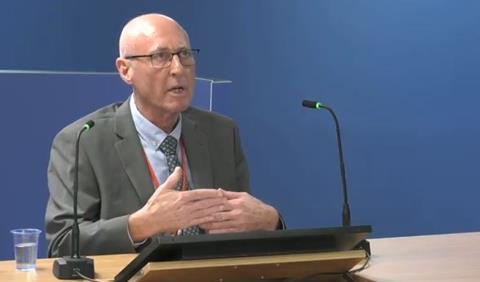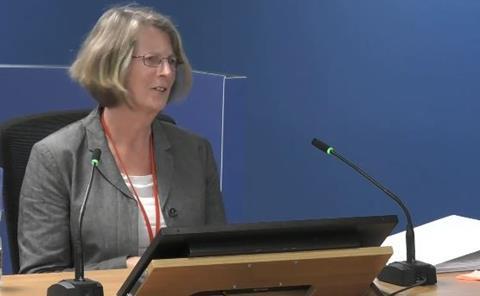TMO head of capital investment admits ‘offline’ pre-appointment summit undermined his transparency claims
Kensington and Chelsea Tenant Management Organisation went against its own lawyers’ advice with a secret pre-appointment meeting at which value engineering options were discussed with future Grenfell Tower refurbishment main contractor Rydon, it has emerged.
David Gibson, KCTMO’s then head of capital investment and a senior client-side figure in the refurbishment – which led to the catastrophic spread of 2017’s fire and the loss of 72 lives – admitted that an “offline” March 2014 meeting with Rydon had covered topics that broke EU rules, according to the advice.

Yesterday’s Grenfell Tower Inquiry hearing was told that the meeting took place hours before Rydon was formally notified that it was the preferred bidder for the refurbishment project because of its £9.2m bid and its evaluation score in the procurement exercise.
Rydon had already been tipped off that it was in “pole position” for the contract but KCTMO bosses were keen to get its agreement to find a further £800,000 in savings before formally approving its preferred bidder status – even though the move was a breach EU procurement rules.
Giving evidence to the inquiry for a second day on Thursday, Gibson said the tender period had been extended by two weeks – to 14 February 2014 and the delay left the KCTMO team “very little time” to get a report on the project’s winning bidder to board members.
Inquiry barrister Richard Millett QC asked whether any minutes or notes were taken of the 18 March 2014 meeting, which took place behind the backs of project architect Studio E and cost consultant Artelia.
“I probably took some notes of my own but it was an offline meeting,” Gibson replied.
Millett asked Gibson whether he meant that the meeting was a “secret meeting and therefore should be unrecorded”. Gibson replied “yes”.
Gibson subsequently agreed that if unsuccessful shortlisted bidders Durkan and Mulalley had known Rydon had been awarded the Grenfell contract because it had agreed to reduce its price by £800,000, there would have been a risk they may challenge KCTMO’s decision.
Millett asked Gibson about legal advice given to KCTMO by Trowers and Hamlins, which was contained in an email from KCTMO procurement manager Jenny Jackson.
The law firm said KCTMO could not enter into negotiations with any of the tenderers prior to the award of a contract. It concluded that the only “EU compliant” options were to award the contract based on the original criteria and then discuss value engineering options afterwards or not award the contract to any bidder and start a new procurement exercise.
Jackson suggested following the Trowers and Hamlins advice relating to post-appointment negotiations about procurement but said there would “need to be some ‘informal’ discussion with the preferred contractor prior to award so there is an understanding of the approach”.
She also said that no references to “value engineering” should be made before the contract was awarded in case the process was challenged.
Gibson was asked whether he had read and understood the advice from Trowers and Hamlins. He said that he had.
Millett asked Gibson whether he had considered that Jackson’s suggested approach might be at odds with the legal advice. Gibson confirmed he did.
Millett said that that KCTMO not only had discussions with Rydon about the approach to value engineering post-appointment but also talked directly about savings amounts that could be delivered through value engineering as part of the decision about whether to award the contract.
He asked: “Was that not completely contrary to the clear legal advice from Trowers and Hamlins that you received and understood?” Gibson replied: “It was.”
But he denied the discussions and the earlier tip-off that Rydon was in “pole position” before shortlisted bidder interviews had taken place were evidence that the future main contractor was given preferential treatment in the procurement process.
Millett asked Gibson why he did not mention that KCTMO had gone against legal advice in its selection of Rydon in his written witness statements to the inquiry.
“I had forgotten all about this,” Gibson replied. “I had retired; this was two years, three years afterwards.”
Millett read back Gibson’s witness statement assertion that the tender process for the Grenfell refurbishment was “rigorous and transparent”, and asked how that could possibly have been the case.
Gibson insisted that the process of assessing tenders had been “rigorous”. But he added: “I agree that there wasn’t full transparency because there had been an offline meeting to overcome a problem.”
At the end of his evidence on Thursday morning, Gibson was asked what he would have done differently on the Grenfell project with hindsight.
His answer was brief. “When I raised the query about the insulation and got the assurance I received, I would have liked to have followed that up,” he said.
Gibson was referring to a conversation he claims took place with Rydon contracts manager Simon Lawrence in 2015, in which Lawrence said the insulation materials being used on the outside of Grenfell Tower were “completely inert”.
Lawrence denied the assurance had been given in his evidence to the inquiry in July.
Client Design Adviser “would have been a complication”
KCTMO project manager for Grenfell Claire Williams also gave evidence to the inquiry on Thursday.
She was asked about the organisation’s decision not to appoint a Client Design Adviser (CDA) to help it with architectural issues after Rydon was awarded the design and build contract for the refurbishment project.
She concurred with Gibson’s evidence on Wednesday that the project team did not feel additional advice on design integrity and compliance was necessary.

“I understood what they did but I couldn’t think of anything positive about it,” she said of CDAs. “We had a design and build contract where the responsibilities for the design lie clearly with the contractor.
“This would be an additional tier that, perhaps, wouldn’t bring anything to the table. Our design and build contract was based around the fact that we had items that needed specialist design.
“It did seem like they were going to comment on everything across the board, and we had specialist areas of design and contracts in place to cover those.”
Inquiry chair Sir Martin Moore-Bick asked Williams whether it had occurred to her that specialist contractors might make mistakes that a CDA could alert the TMO to.
She replied: “The specialist design was such that we felt the specialists who did the design did that day in, day out. A design adviser would be unlikely to have specialisms in cladding and M&E as well as the other elements.”
Williams said a detailed £31,500 proposal to provide a CDA for the project put together by Artelia had essentially been unsolicited.
She told the inquiry that she had only asked for more detail on what services a CDA could offer and believed Artelia had tailored a “standard document” and quoted a price in response.
“There was a timescale this person wanted to look through everything and then you got a report at the end of it,” she said.
“It was another process brought into the system, rather than the straightforward contractual arrangement we had with our contractor who had the design responsibility.
“There are many things about this that don’t resonate as viable.”
Williams insisted the cost proposed by Artelia had not been a consideration in the TMO’s decision not to appoint a CDA.
“The issue was clearly to do with design accountability; it was never to do with cost,” she said. “It would have been a complication in the design responsibility in the contract.”
The inquiry continues.


























No comments yet